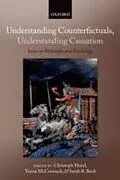A team of leading philosophers and psychologists present a fresh analysis of the connections between causal relations and counterfactual judgments. They examine the cognitive underpinnings of causal and counterfactual reasoning, and the impact of empirical work in cognition on philosophical concerns about causation and counterfactuals.
Zusammenfassung
How are causal judgements such as 'The ice on the road caused the traffic accident' connected with counterfactual judgements such as 'If there had not been any ice on the road, the traffic accident would not have happened'? This volume throws new light on this question by uniting, for the first time, psychological and philosophical approaches to causation and counterfactuals. Traditionally, philosophers have primarily been interested in connections between causal andcounterfactual claims on the level of meaning or truth-conditions. More recently, however, they have also increasingly turned their attention to psychological connections between causal and counterfactual understanding or reasoning. At the same time, there has been a surge in interest in empiricalwork on causal and counterfactual cognition amongst developmental, cognitive, and social psychologists-much of it inspired by work in philosophy. In this volume, twelve original contributions from leading philosophers and psychologists explore in detail what bearing empirical findings might have on philosophical concerns about counterfactuals and causation, and how, in turn, work in philosophy might help clarify the issues at stake in empirical work on the cognitive underpinnings of, andrelationships between, causal and counterfactual thought.
Zusammenfassung
How are causal judgements such as 'The ice on the road caused the traffic accident' connected with counterfactual judgements such as 'If there had not been any ice on the road, the traffic accident would not have happened'? This volume throws new light on this question by uniting, for the first time, psychological and philosophical approaches to causation and counterfactuals. Traditionally, philosophers have primarily been interested in connections between causal andcounterfactual claims on the level of meaning or truth-conditions. More recently, however, they have also increasingly turned their attention to psychological connections between causal and counterfactual understanding or reasoning. At the same time, there has been a surge in interest in empiricalwork on causal and counterfactual cognition amongst developmental, cognitive, and social psychologists-much of it inspired by work in philosophy. In this volume, twelve original contributions from leading philosophers and psychologists explore in detail what bearing empirical findings might have on philosophical concerns about counterfactuals and causation, and how, in turn, work in philosophy might help clarify the issues at stake in empirical work on the cognitive underpinnings of, andrelationships between, causal and counterfactual thought.
Titel
Understanding Counterfactuals, Understanding Causation Issues in Philosophy and Psychology
EAN
9780191618390
ISBN
978-0-19-161839-0
Format
E-Book (pdf)
Hersteller
Herausgeber
Veröffentlichung
27.10.2011
Digitaler Kopierschutz
Adobe-DRM
Anzahl Seiten
288
Jahr
2011
Untertitel
Englisch
Unerwartete Verzögerung
Ups, ein Fehler ist aufgetreten. Bitte versuchen Sie es später noch einmal.
